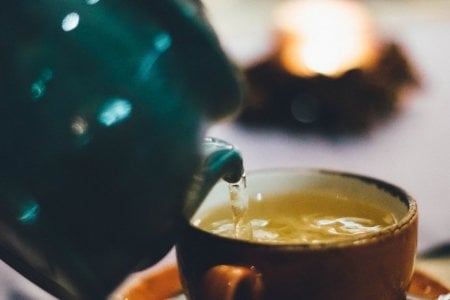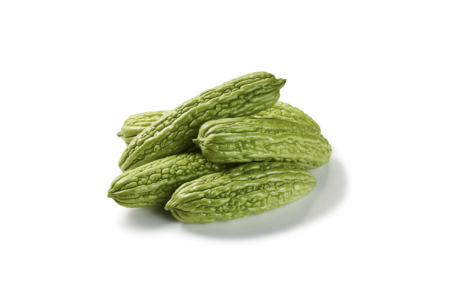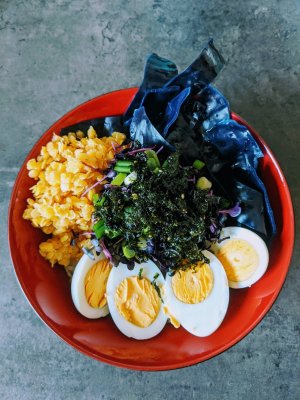Want to live a long life? Try these 4 famous Okinawan food staples!
- Replies 8
Even though ageing is a natural and essentially universal process, more and more people are actively trying to avoid it. And no, we are not here to judge, but we are here to remind you that with age comes vitality, wisdom, and emotional vibrancy - not just ‘wrinkles’. What more people should aim for is ‘ageing well’, or in other words, ensuring you can still ‘live well’ whilst ageing and there is one place in the world that seems to do this better than everyone else. That place is Okinawa, a small island just southwest of Japan's mainland.
Official statistics from the Japan Health Ministry say that the population of this island is around 1.4 million people - and they are known for their longevity. So much so, that bestselling authors Héctor García and Francesc Miralles dedicated an entire book to discovering how these individuals live, titled Ikigai: The Japanese Secret to a Long and Happy Life (Ikigai translates to ‘one's reason for being’ or ‘one's purpose in life’.)
García and Miralles consider Okinawan diet staples as some of the ‘secret ingredients’ of the people’s longevity. ‘[We took] a trip to interview the eldest people there and learn how they live, how they relate to each other, what they eat, how they move, and what are their Ikigais.’
So we are going to take a closer look at the four key foods that experts believe contribute to these people's longevity.
Green Tea
'Green tea is magical,' says Miralles. '[It has potent] antioxidants that capture free radicals. There are a lot of studies on the effect of green tea [on] the ageing process of cells.'
Apparently, green tea's main catechin EGCG is 100 times more potent than the antioxidant power of vitamin C and 25 times more than vitamin E. Studies have also found that EGCG may help provide anti-inflammatory benefits, support brain function, promote healthy blood sugar levels, and reduce heart disease risks.
‘In Okinawa, they are not drinking coffee. They are drinking green tea all day,’ Miralles adds. (Specifically, they favour a blend of green and jasmine tea called sanpin-cha.) ‘This can be a factor that is important [for longevity.]’
So, maybe instead of having two coffees a day, you should try having one coffee and one green tea - because not only does green tea have caffeine in it, but it is loaded with a bunch of other great elements that clearly have health benefits. If you don’t like the taste, we recommend adding a teaspoon of honey. This sweetens it up a bit, and we all know a little honey does no real harm.
Shikuwasa
If Okinawans are eating dessert, you can almost guarantee they have some Shikuwasa on their plate. Shikuwasa is a small green fruit that is kind of like an orange. It is rich in flavonoids and has ‘something called nobiletin in much higher concentrations than any other citrus in the world.’ according to García. Nobiletin is a citrus bioflavonoid that has been linked with anti-inflammatory and healthy ageing benefits; one 2020 study even found that nobiletin could increase life span and enhance resilience against various stressors.
We did our best to see if you could buy Shikuwasa in Australia, but it doesn’t seem like you can. You can, however, buy it in juice form online at Amazon AU. In English, Shikuwasa is known as citrus depressa.
Goya
Goya comes from the ‘gourd family’ and is known as the ‘bitter melon’. It’s packed with phytonutrients and vitamins, namely vitamins C, A, and E, as well as B vitamins, including folate and B2. And this is only the start! It also contains specific compounds that can help balance blood sugar; these compounds (called chantarin, polypeptide-p, and vicine) have been shown to act similar to insulin when they're consumed. Given how important blood sugar balance is for metabolic health (which, in turn, is critical for longevity), we can consider goya to be one powerful melon!
According to García, ‘You can cook it in many, many ways, and you find it in many recipes. [Okinawans] eat it with pork, they eat it with other vegetables… [It's] very balanced.’ The good news about this ingredient is that you can actually buy Goya at Coles to try in your own recipes! It’s called ‘Bitter Melon’ in Coles and you can grab 200g for $2. Maybe try throwing it in a stir fry or curry and see if you enjoy it?
Seaweed
I’m sure seaweed being on this list is a surprise to no one. We all know the benefits of eating seaweed, but it’s not the seaweed you have on your sushi that the Okinawans are eating. They eat a type of seaweed called ‘umibudo’ which is an Okinawan green seaweed that has a grape-like shape (umibudo actually translates to 'sea grapes' in Japanese).
We did find umibudo for sale at one food distributor in Australia, but unfortunately, we seem to only be able to order it in wholesale quantities, which doesn’t help anyone. However, the good news is, all the different types of seaweeds actually contain flavonoids and carotenoids, which function to fight off free radicals within the body—which, as we’ve learnt, seems to be great for longevity. Seaweed is also a major source of iodine, which supports a healthy thyroid, and it's an abundant source of folate, a natural form of vitamin B9 that promotes the production of healthy new red blood cells and supports heart function. So any seaweed you can get your hands on at your local supermarket is sure to be good for you.
So there you have it! This is what it means to eat, live and age ‘well’. If you want to eat (and live) like an Okinawan why not try adding some of these staples into your diet? The easiest would definitely be green tea, seeing you can buy it at all our major supermarkets. We also think it’s best we end on this little tip that García put in his book, it’s all about ‘balance’, he says. ‘There is no excess.’
Will you be trying any of these ingredients in the next few days? Tell us in the comments below!
Official statistics from the Japan Health Ministry say that the population of this island is around 1.4 million people - and they are known for their longevity. So much so, that bestselling authors Héctor García and Francesc Miralles dedicated an entire book to discovering how these individuals live, titled Ikigai: The Japanese Secret to a Long and Happy Life (Ikigai translates to ‘one's reason for being’ or ‘one's purpose in life’.)
García and Miralles consider Okinawan diet staples as some of the ‘secret ingredients’ of the people’s longevity. ‘[We took] a trip to interview the eldest people there and learn how they live, how they relate to each other, what they eat, how they move, and what are their Ikigais.’
So we are going to take a closer look at the four key foods that experts believe contribute to these people's longevity.
Green Tea
'Green tea is magical,' says Miralles. '[It has potent] antioxidants that capture free radicals. There are a lot of studies on the effect of green tea [on] the ageing process of cells.'
Apparently, green tea's main catechin EGCG is 100 times more potent than the antioxidant power of vitamin C and 25 times more than vitamin E. Studies have also found that EGCG may help provide anti-inflammatory benefits, support brain function, promote healthy blood sugar levels, and reduce heart disease risks.
‘In Okinawa, they are not drinking coffee. They are drinking green tea all day,’ Miralles adds. (Specifically, they favour a blend of green and jasmine tea called sanpin-cha.) ‘This can be a factor that is important [for longevity.]’
So, maybe instead of having two coffees a day, you should try having one coffee and one green tea - because not only does green tea have caffeine in it, but it is loaded with a bunch of other great elements that clearly have health benefits. If you don’t like the taste, we recommend adding a teaspoon of honey. This sweetens it up a bit, and we all know a little honey does no real harm.
Shikuwasa
If Okinawans are eating dessert, you can almost guarantee they have some Shikuwasa on their plate. Shikuwasa is a small green fruit that is kind of like an orange. It is rich in flavonoids and has ‘something called nobiletin in much higher concentrations than any other citrus in the world.’ according to García. Nobiletin is a citrus bioflavonoid that has been linked with anti-inflammatory and healthy ageing benefits; one 2020 study even found that nobiletin could increase life span and enhance resilience against various stressors.
We did our best to see if you could buy Shikuwasa in Australia, but it doesn’t seem like you can. You can, however, buy it in juice form online at Amazon AU. In English, Shikuwasa is known as citrus depressa.
Goya
Goya comes from the ‘gourd family’ and is known as the ‘bitter melon’. It’s packed with phytonutrients and vitamins, namely vitamins C, A, and E, as well as B vitamins, including folate and B2. And this is only the start! It also contains specific compounds that can help balance blood sugar; these compounds (called chantarin, polypeptide-p, and vicine) have been shown to act similar to insulin when they're consumed. Given how important blood sugar balance is for metabolic health (which, in turn, is critical for longevity), we can consider goya to be one powerful melon!
According to García, ‘You can cook it in many, many ways, and you find it in many recipes. [Okinawans] eat it with pork, they eat it with other vegetables… [It's] very balanced.’ The good news about this ingredient is that you can actually buy Goya at Coles to try in your own recipes! It’s called ‘Bitter Melon’ in Coles and you can grab 200g for $2. Maybe try throwing it in a stir fry or curry and see if you enjoy it?
Seaweed
I’m sure seaweed being on this list is a surprise to no one. We all know the benefits of eating seaweed, but it’s not the seaweed you have on your sushi that the Okinawans are eating. They eat a type of seaweed called ‘umibudo’ which is an Okinawan green seaweed that has a grape-like shape (umibudo actually translates to 'sea grapes' in Japanese).
We did find umibudo for sale at one food distributor in Australia, but unfortunately, we seem to only be able to order it in wholesale quantities, which doesn’t help anyone. However, the good news is, all the different types of seaweeds actually contain flavonoids and carotenoids, which function to fight off free radicals within the body—which, as we’ve learnt, seems to be great for longevity. Seaweed is also a major source of iodine, which supports a healthy thyroid, and it's an abundant source of folate, a natural form of vitamin B9 that promotes the production of healthy new red blood cells and supports heart function. So any seaweed you can get your hands on at your local supermarket is sure to be good for you.
So there you have it! This is what it means to eat, live and age ‘well’. If you want to eat (and live) like an Okinawan why not try adding some of these staples into your diet? The easiest would definitely be green tea, seeing you can buy it at all our major supermarkets. We also think it’s best we end on this little tip that García put in his book, it’s all about ‘balance’, he says. ‘There is no excess.’
Will you be trying any of these ingredients in the next few days? Tell us in the comments below!










